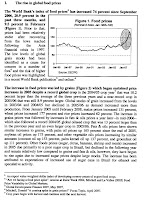Last Minute Attempt to Push Through a WTO Expansion "Deal" Fails
WASHINGTON, D.C. - Despite trade ministers' hopes for a last-minute deal, World Trade Organization (WTO) negotiations collapsed yet again today, and observers at the talks in Geneva say that the failure is not surprising, given the reluctance of India and other developing nations to sacrifice food security measures in the wake of the recent global spike in food prices.
"Given what's been on the table, no deal is better than a bad deal. A Doha conclusion would have had major negative impacts for workers and farmers in developing countries. The tariff cuts demanded of developing countries would have caused massive job loss, and countries would have lost the ability to protect farmers from dumping, further impoverishing millions on the verge of survival," said Deborah James, Director of International Programs for the Center for Economic and Policy Research, who has been observing the talks in Geneva.
It is unclear why negotiations were proceeding, given the fact that the U.S. delegation does not have a mandate to conclude negotiations, as made clear by a letter from Senators Feingold and Byrd sent to President Bush last week. In addition, cuts in subsidies agreed to by the U.S. are also incompatible with the new U.S. Farm Bill passed by Congress, and over-riding a veto by President Bush.
Many developing nations not invited to participate in the exclusive "Green Room" meetings in Geneva this past week are likely to continue strong opposition to a deal in the midst of a global economic downturn and increasing concerns over food security.
At a time when many countries are seeking to reduce dependence on troubled economies in the U.S. and Europe, and as fears of a global recession loom, many nations are questioning the development gains to be achieved from trade liberalization. The projected gains from the Doha Round offer developing countries very little in potential gains. According to World Bank modeling, developing country benefits would be just 16 percent of total world gains, or 0.16 per cent of GDP. This works out to less than a penny per day per capita in the developing world. Poverty reduction - which in itself would be very limited - would reach only 2.5 million people.[1] These projections do not include many of the costs of implementing the Doha Round, which UNCTAD estimates to be as much as four times the projected gains.
The Doha Round could also increase world prices for food.[2] Since most developing countries are net food importers, the recent increase in food prices has led some developing country governments to reconsider food security mechanisms such as tariffs and domestic subsidies, which the WTO seeks to reduce. A number of countries have also imposed restrictions on exports, in response to the food crisis.
"There just hasn't been much to gain for developing countries in this round - or for that matter, the majority of people even in the rich countries," said CEPR Co-Director and economist, Mark Weisbrot. "The attempts by the rich countries to reduce policy space for developing countries in manufacturing are widely seen as 'kicking away the ladder' that rich countries like the United States used when they were developing countries.
"The whole process of subordinating national policy to special commercial interests - whether in agriculture, telecommunications, pharmaceuticals (one of the most powerful interests and gainers in the WTO), or the financial sector - has gone way too far. Growth and development in most countries has been hurt, and they are pushing back. In the United States, too, rising inequality and now an economic downturn have provoked a backlash."
Throughout the negotiations, some developing nations promoted trade policies and objectives at odds with the Doha Round's objectives of opening developing country markets, including commitments to food sovereignty and defending policy space for alternative forms of economic development.
In a written statement, Bolivian president Evo Morales said that, "The WTO negotiations have turned into a fight by developed countries to open markets in developing countries to favor their big companies."
[1] Kevin P. Gallagher and Timothy A. Wise, "Back to the Drawing Board: No Basis for Concluding the Doha Round of Negotiations". Research and Information System for Developing Countries Issue Brief. No. 36, April 2008.
[2] Sandra Polaski, "Winners and Losers: Impact of the Doha Round on Developing Countries". Carnegie Endowment for International Peace, March 2006.
--CEPR press release, July 29, 2008
The Center for Economic and Policy Research is an independent, nonpartisan think tank that was established to promote democratic debate on the most important economic and social issues that affect people's lives. CEPR's Advisory Board of Economists includes Nobel Laureate economists Robert Solow and Joseph Stiglitz; Richard Freeman, Professor of Economics at Harvard University; and Eileen Appelbaum, Professor and Director of the Center for Women and Work at Rutgers University.




















